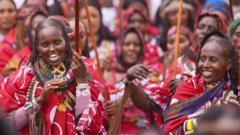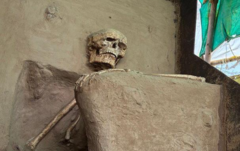In southern Ethiopia, thousands flocked to Arda Jila Badhasa to partake in the Gada ceremony, a vibrant celebration marking the ceremonial transition of leadership within the Borana community. Held over a week, this significant cultural festival highlights the community's unique form of governance, with a new Abbaa Gadaa taking the helm every eight years. Attendees donned traditional clothing, showcasing the diversity of the Borana culture, while married women participated in a distinctive procession wielding wooden batons known as "siinqee," a symbol of protection.
Celebration of Tradition: Ethiopia's Gada Ceremony Marks Leadership Transition

Celebration of Tradition: Ethiopia's Gada Ceremony Marks Leadership Transition
Thousands gather in Ethiopia to witness the transfer of power in the Gada ceremony, a time-honored tradition rooted in community democracy.
Despite restrictions on women's leadership roles within the Gada system, their vital contributions are evident during the festivities, as they prepare accommodations and meals for attendees. The Gada structure emphasizes the education of young boys who aspire to leadership roles, beginning their training at a young age, which includes oral histories and practical tests. With the recent ceremony, Guyo Boru Guyo has been appointed as the 72nd Abbaa Gadaa, tasked with guiding the community through sustained practice of cultural traditions and conflict resolution in a region fraught with challenges.
As the Borana continue to uphold their cultural heritage, the Gada ceremony remains a testament to their democratic values and strong communal ties, bridging generations and ensuring the resilience of their traditions.
As the Borana continue to uphold their cultural heritage, the Gada ceremony remains a testament to their democratic values and strong communal ties, bridging generations and ensuring the resilience of their traditions.



















